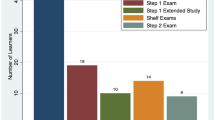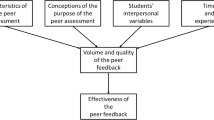Abstract
Effects of student versus staff tutoring on student learning in a problem-based, health sciences curriculum were studied. Academic achievement of 334 tutorial groups guided by staff tutors was compared with achievement of 400 groups guided by student tutors. In addition, students rated their tutor's performance on four behaviors considered critical to facilitating student learning. Overall, students guided by a staff tutor achieved somewhat better. In terms of practical significance, the difference was, however, fairly small. Staff tutors were rated as more knowledgeable and their contributions as more relevant. In addition, they asked stimulating questions to a larger extent. However, an interaction effect was found between the ratings and the year of study: Peer tutors displayed the supportive behaviors more extensively in the first year, whereas staff tutors' ratings were higher as the curriculum advanced. These results were interpreted in terms of the cognitive congruence framework.
Similar content being viewed by others
References
Barrows, H.S. & Tamblyn, R.M. (1980).Problem-based Learning. New York, NY: Springer Publishing.
Bloxom, B., Caul, W.F., Fristoe, M. & Thomson, W.J. (1975). On the use of student led discussion groups.The Educational Forum 39: 223–230.
Carsrud, A.L. (1979). Undergraduate tutors: Are they useful?Teaching of Psychology 6: 46–49.
Cohen, P.A. (1980). Student ratings of instruction and student achievement: A meta-analysis of multisection validity studies.Review of Educational Research 51: 281–309.
Collier, G.K. (1980). Peer group learning in higher education: The development of higher order skills.Studies in Higher Education 5: 55–62.
Cornwall, M.G. (1980).Students as Teachers: Peer Teaching in Higher Education. Amsterdam, The Netherlands: Centrum voor Onderzoek van het Wetenschappelijk Onderwijs.
DeVoider, M.L., DeGrave, W.S. & Gijselaers, W. (1985). Peer teaching: Academic achievement of teacher-led versus student-led discussion groups.Higher Education 14: 643–650.
Howard, G.S. & Maxwell, S.E. (1980). Correlation between student satisfaction and grades: A case of mistaken causation?Journal of Educational Psychology 72: 810–820.
Moust, J.H.C. (1993).De rol van tutoren in probleemgestuurd onderwijs: contrasten tussen studenten docent-tutoren (The role of tutors in problem-based learning: Contrasts between student and staff tutors;) Maastricht, The Netherlands: Universitaire Pers Maastricht.
Norman, G.R. & Schmidt, H.G. (1992). The psychological basis of problem-based learning: A review of the evidence.Academic Medicine 67: 557–565.
Peterson, P.L. & Swing, S.R. (1985). Students' cognitions as mediators of the effectiveness of small-group learning.Journal of Educational Psychology 77: 299–312.
Schmidt, H.G. (1983). Problem-based learning: Rationale and description.Medical Education 17: 11–16.
Author information
Authors and Affiliations
Additional information
Parts of this article have been presented to the Annual Meeting of the American Educational Research Association, Atlanta, GA, April, 1993.
Rights and permissions
About this article
Cite this article
Schmidt, H., Van Der Arend, A., Kokx, I. et al. Peer versus staff tutoring in problem-based learning. Instr Sci 22, 279–285 (1994). https://doi.org/10.1007/BF00891781
Issue Date:
DOI: https://doi.org/10.1007/BF00891781




